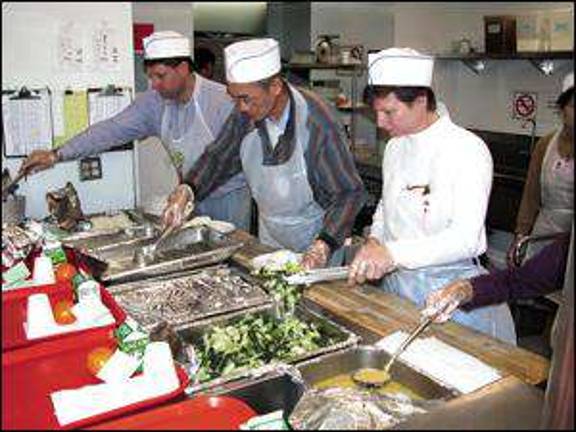In search of more effective managers UPS takes philanthropic approach

Andover - Mark Haneman, Andover resident and information services facilities/security & hardware planning manager for UPS in Mahwah, left his life behind for four weeks to work with local youth and adults in the San Francisco area. He worked with organizations such as Tenderloin Children’s Playground and S.F. Network Ministries as part of UPS’s Community Internship Program, a unique and unorthodox management training course. The program allows UPS executives to see firsthand the social issues that are impacting America’s workforce, such as addiction, poverty, illiteracy and prejudice. UPS believes exposure to diverse situations and cultures helps managers to better understand the issues their employees face daily, and, as a result, become more diverse minded and help to bridge the gap between corporations and society. UPS sends 30 to 40 top level managers per year to all areas of the country. A total of 1,300 employees participated from 1968 to 2004, at a cost to the company of approximately $10,000 for each participant. “Having been with UPS for 19 years, I have heard so much about the program,” said Haneman. “Many people encouraged me to go and the program lived up to my expectations. It has made me more socially aware of America’s issues and has made me want to get involved in my own community, which is part of the design of the program.” Haneman left his family behind to live in what he described as “very modest” accommodations. He traveled by foot or shuttle bus to meet with the social service agency in the area he was volunteering for that day. He spent his days serving senior citizens lunch in the Chinatown section of the city, playing games with them, and touring the impoverished area. “When you walk the streets, you don’t see the poverty, but I had an opportunity to visit the inside of these eight- by 10-foot homes built in the 1800’s that were meant for single room occupancy, and they’re filled with a family of four and all of their life’s belongings. “They have shared kitchens and bathrooms with other families,” Haneman continued. “Because of the language barriers, these people don’t even want to move. I came away from there so grateful for all that I have in Andover, thinking, why do I ever sweat the small things in life,’ when these people don’t even know where their next meal is coming from.” When Haneman worked in the Tenderloin section of San Francisco, he spent time working at the Tenderloin Playground, a city funded after-school program. There, he played with the children, helped them with homework and acted as a role model. He described the playground as typical colorful, cheerful, with happy kids running around in a fenced area. However, the shocking reality he faced was right outside that barrier: Drugs were being pushed, “yellow slavery” was happening (where Asian females are sold into prostitution). “It’s hard to believe this is going on today in America,” said Haneman. He found himself connecting to the children in the after-school program immediately. He described them as friendly, yet in dire need of attention. Within 10 minutes of being there on the first day, he met Mariel, a fourth-grade girl. “She immediately pulled me to the side to show me her flower garden and she entrusted her whole life story to me. She was so eager for attention,” he recalled. Haneman spent his days volunteering in various different capacities, but always taking with him, a lesson in humanity. One evening, he served dinner to over 700 homeless people in the Tenderloin. “Most of the people there were friendly, the majority were appreciative,” said Haneman. Another assignment was to hold a two-day job skills workshop for the homeless, or for those who lived in the Tenderloin neighborhood. Ten people attended. “What surprised me about this experience, was that some of these homeless people were very well educated with college degrees, but just fell upon hard times,” he observed. Haneman left San Francisco with a new appreciation of the young, ambitious and educated people who devote their lives to working in the social service field. “I was so humbled by the people who have dedicated their lives to helping others. They are educated, bright people who don’t make all that much money, but are in it for other reasons.” With only one visit home during his four-week stint, it wasn’t easy for Haneman to leave his family behind. However he found that time went quickly and the experience proved invaluable to him as a human being and as a manager of UPS. “It gave me a better understanding of the UPS workforce and the problems they have personally, such as domestic violence, drug and alcohol addiction,” said Haneman. “So when someone calls in sick, I don’t immediately think the worst. I evaluate the situation and have a better understanding of the challenges people have in their lives. “ UPS has a phrase, Our best asset is our people,’ and it’s true because it’s a labor-intensive job. With a better understanding of the things that impact people, it makes us a more effective company,” he concluded.